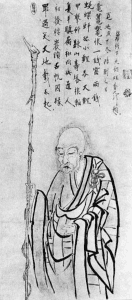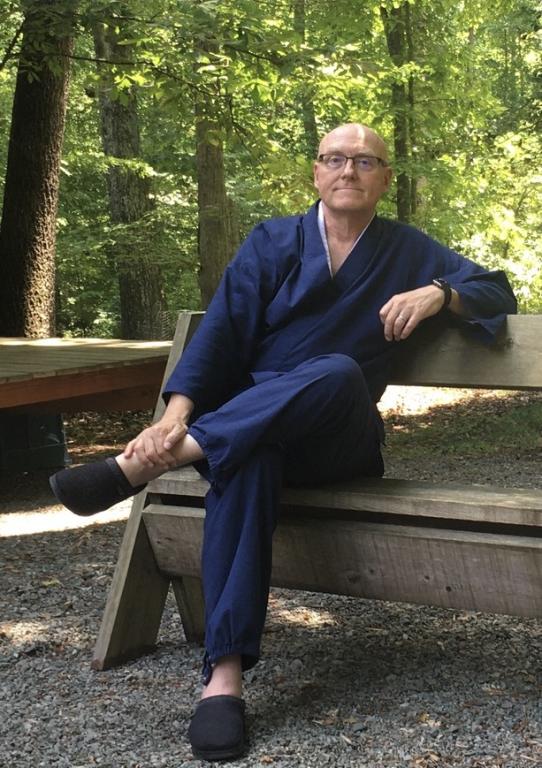Introduction
Note: This is an updated version of an essay from June of ’21. I have several Dōgen related posts coming up this next week, and this came to mind as a good place to begin, emphasizing as it does the One School Zen. So here’s the new version:
When I was translating The Record of Empty Hall and working on the commentary, a respectable scholar sent me a copy of Xutang’s preface (really, more like a book blurb) for Dōgen’s Eihei Goroku, that is, the abridged record of Dōgen. Xutang’s blurb was in the style of mixed Chinese characters and Japanese syllabaries and quite over my head.
Xutang (1185-1269; E., Empty Hall; J. Kido Chigu Zenji), you may know, is an enormously important teacher in the 13th Century Linji (J., Rinzai) lineage of Zen. He had several Japanese successors, one of whom, Nampo Jōmyō Zenji (1235-1309, aka, Daiō Kokushi), is a key link in the ongoing succession of the Rinzai lineage in Japan and now in the global dharma world.
The brilliant Hakuin (1686-1769), whose image of Xutang is above, said that Xutang was his favorite Zen master ever! And it was due to his strong recommendations for students of Zen to become deeply intimate with Xutang’s teaching that I took up the project of translating and commenting on The Record of Empty Hall.
In the process, I stumbled on a story in Complete Poison Blossoms from a Thicket of Thorn: The Zen Records of Hakuin Ekaku (I’ll post that again soon) of the meeting of Xutang and Rujing, Dōgen’s teacher. I found that encounter inspiring as well – I just love that these two seminal figures actually met. I wondered if in Xutang’s blurb for Dōgen’s Record there were any clues that the two of them might have met as well.
Then a few years ago, I became acquainted with a wonderful Bukkokuji monk, Kōgen Czarnik Osho, who is fluent in Japanese. Eventually, a little light went on and I began pestering him and pestering him until he relented and translated Xutang’s preface for Dōgen’s Record. And then I hammered him with objections to petty details and minor quibbles until he double, triple relented.
So here is his translation with his notes. My comments follow:
Xutang’s Preface for Dogen’s Eihei Goroku
Venerable Giin[1] brought Japanese Dōgen Osho’s Eihei compilation. Looking at this composition, it is profound, and not corrupted by words. His sayings capture Tiantong Rujing Osho’s doctrine of no transmission.[2] Moreover, this old monk’s daily expressions are all sounds of jewels, standing out and exceptional. Taking this and looking at it, old Dōgen’s function surpassed his teacher. Those who will take up these records will follow the change of Lu.[3]
[1] Kangan Giin (1217-1300) seems to have begun his Zen training with the Dharumashu and moved to Dōgen’s Kōshōji, near present-day Kyōto, and then followed Dōgen into the mountains and Eiheiji. He appears to have received transmission from Dōgen’s primary successor, Koun Ejō, and then more than a decade after Dōgen’s death, took the Eihei koroku to China so that it could be abridged and sanctioned by another successor of Rujing, Wuwai Yiyuan. Upon his return from China, Giin established himself on Kyūshū and is regarded as the founder of the Higo Branch of Sōtō Zen. Click here for more. See Did Dōgen Drop and When for more about Giin’s trip to China, including the definitive confirmation of Dōgen’s awakening experience.
[2] According to the notes, the phrase “no transmission” is shorthand for “not depending on words or letters, special transmission outside scriptures” from the verse attributed to Bodhidharma, because the first and last characters are the same.
[3] Also according to notes, the phrase “follow the change of Lu” is a reference to a saying, probably by Confucius, referring to old kingdoms during the Spring and Autumn Period in China: “If kingdom Qi would change, it would become like kingdom Lu. If kingdom Lu would change, it would become the Way.”
A General Comment on Xutang’s Preface
Xutang holds nothing back in his praise for Dōgen. He equates the transmission from Rujing to Dōgen with Bodhidharma’s transmission of no transmission, clearly going beyond branch lineage affiliation. It seems that for Xutang, like Dōgen, the point was just about the buddhadharma, the awake truth.
Xutang says that Dōgen’s activities of body, speech, and mind are like the jingling of jewels. Another reference to these jingling jewels, by the way, can be found in Going Through the Mystery’s One Hundred Questions, 67 Where is the treasure land? (Scroll down for the excerpted verse that has this phrase.)
Now how would Xutang have heard Dōgen’s jewels jingling unless he and Dōgen had met?
Xutang also says that the Japanese Dōgen went beyond the Chinese Rujing. How’s that for going beyond ethnicity? And also that if a person takes up Dōgen’s Record that they will change into the Way, like a dragon that changes at the skeletal level.
That’s one helluva blurb and one helluva promise for a book.
What Xutang doesn’t include is even the slightest whiff about how this guy Dōgen was inventing some new Zen school that involved a hostility to samadhi-kōan-awakening and instead emphasized a new practice, never heard of before from any of the greatest teachers in Great Song China – shikantaza. Such a hostility to samadhi-kōan-awakening are merely recent by-roads of the now discredited Post Meiji Sōtō Orthodoxy (PMSO)™.
Instead, Xutang recognizes Dōgen as a peer, as a Zen master in the school of Bodhidharma, as an awakening being in the vast ocean of buddhadharma.
Dōshō Port began practicing Zen in 1977 and now co-teaches with his wife, Tetsugan Zummach Sensei, with the Vine of Obstacles Zen, an online training group. Dōshō received dharma transmission from Dainin Katagiri Rōshi and inka shōmei from James Myōun Ford Rōshi in the Harada-Yasutani lineage. He is also the author of Keep Me In Your Heart a While: The Haunting Zen of Dainin Katagiri. Dōshō’s translation and commentary on The Record of Empty Hall: One Hundred Classic Koans, was published in 2021 (Shambhala). His third book, Going Through the Mystery’s One Hundred Questions, is now available. Click here to support the teaching practice of Dōshō Rōshi.













